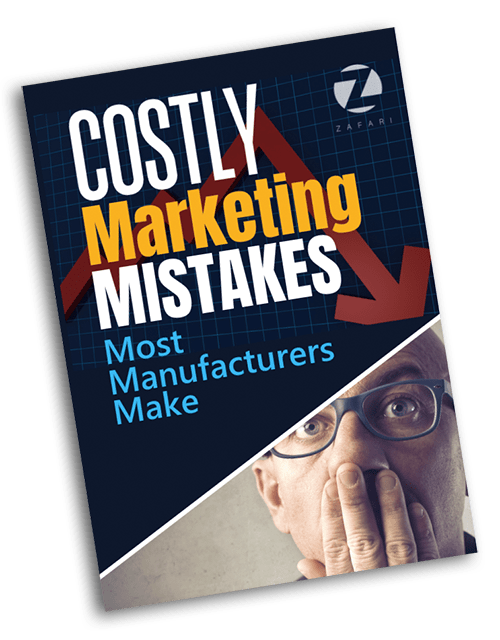In industrial marketing, many marketers are prone to one common pitfall – the curse of knowledge.
The curse of knowledge is a phenomenon that happens often because marketers are so close to their industry and products, they forget what their average customer doesn’t know. As a result, they often use too much lingo and technical jargon that is confusing to customers and can hurt sales.
In this article, we’ll explore the effects of the curse of knowledge on marketing efforts and discuss practical strategies to overcome it.
Understanding the Curse of Knowledge in Industrial Marketing
Imagine you’re a manufacturer of industrial power cutters. You’ve spent years learning the design, engineering, and functionality of your product. You understand its components, its cutting-edge technology, and its superior performance compared to competitors.
Now, when it comes to marketing your power cutter, you are excited to highlight its unique features and benefits. Right?
However, you present all these details with technical specifications, scientific terminology, and industry jargon that only fellow engineers or specialists can understand.
For instance, instead of simply stating that your power cutter has a “high-powered motor for increased efficiency,” you might delve into the details of its “induction motor with electromagnetic coils and variable frequency drive for optimized torque output.”
No doubt that this information is impressive to you and your engineering team. But what about those average industrial business owners who just want to know if your product can get the job done efficiently and reliably?
As a result, your marketing message fails to resonate with your target audience. They just abandon your website after going through some lines. Maybe they never read your newsletter.
Thanks to the complexity of the language. No wonder your potential customers can choose a competitor’s product that offers a simpler, more understandable explanation of its benefits.
In this scenario, the curse of knowledge has damaged your marketing efforts. By serving the excessive technical aspects of your product, you’ve overlooked the need to make it easy to understand for your audience.
To overcome this challenge, you must strive for clarity, simplicity, and relevance in your messaging, ensuring that even those unfamiliar with your industry can grasp the value proposition of your power cutter.
The Impact on Marketing Effectiveness
The curse of knowledge can undermine your marketing effectiveness. When your messaging is complicated and not easy to understand, it can hinder engagement and conversion. The reason is clear—why will your audience buy from you when they don’t understand your message?
As a result, prospective customers may leave your website or marketing materials prematurely because they can’t grasp the value proposition or benefits of your offerings.
Moreover, confusion may lead to distrust. If consumers struggle to understand what you want to say, they may perceive your brand as unprofessional or lacking credibility.
Overcoming the Curse of Knowledge and Simplifying Your Marketing Message
So, how can industrial marketers break free from the Curse of Knowledge and create more compelling marketing messages?
It starts with a basic shift in perspective and a commitment to keep your message simple and comprehensive.
Here are some actionable steps to consider:
Put Yourself in Your Audience’s Shoes
Take a step back and see your business from the viewpoint of your target audience.
This will give you insights into their pain points, requirements, and concerns. Above all, you will get to know what language they use to describe their needs.
By understanding your audience’s mindset, you can tailor your messaging to resonate with them on a deeper level.
Eliminate Jargon and Acronyms
You may feel tempted to impress your audience with technical terms or acronyms. But, like we said before, these terms may be familiar to you, but they can confuse your target audience. We call this ‘insider language’ and it makes people confused and uncomfortable when they don’t understand it.
Instead, use simple, straightforward language that anyone can understand.
Focus on Benefits, Not Features
Rather than throwing all the technical specifications or complex product features to your clients, highlight the benefits of your product.
How will your product or service improve their production or solve their problems?
Create a vivid picture of the positive things they can expect, and emphasize the value proposition in clear, compelling terms.
Keep in mind that your marketing aims to help more than just make a sale.
Test and Iterate
Don’t be afraid to experiment with different messaging strategies and monitor the results. A/B testing, surveys, and feedback mechanisms can provide valuable insights into what resonates most with your audience.
Continuously iterate and optimize your messaging based on real-world data and feedback.
(Also Read: Cute, Clever and Creative Marketing.)
Conclusion
The curse of knowledge is a real challenge that many businesses face in their marketing efforts. Using jargon or high technical knowledge often makes marketing messages complicated for the average user.
However, it shouldn’t be difficult to overcome such a tendency.
By taking proactive steps to simplify communication, businesses can break free from this curse and connect more effectively with their target audience.
Remember, clarity and empathy are the keys to engaging and converting potential customers.
By putting yourself in your audience’s shoes and focusing on their needs and preferences, you can create marketing messages that resonate, inspire action, and drive results.
However, the curse of knowledge is just the tip of the iceberg. Maybe there are many shortcomings and loopholes in your marketing campaign. Don’t worry! We have covered them all in our guide “Costly Marketing Mistakes Most Manufacturers Make”. Download it now to make your marketing as effective as it should be.






